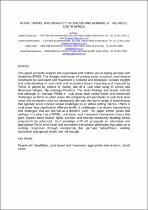JavaScript is disabled for your browser. Some features of this site may not work without it.
- ResearchSpace
- →
- Research Publications/Outputs
- →
- Conference Publications
- →
- View Item
| dc.contributor.author |
Chakwizira, J

|
|
| dc.contributor.author |
Nhemachena, C

|
|
| dc.contributor.author |
Dube, S

|
|
| dc.contributor.author |
Maponya, G

|
|
| dc.date.accessioned | 2010-12-23T10:12:09Z | |
| dc.date.available | 2010-12-23T10:12:09Z | |
| dc.date.issued | 2010-10 | |
| dc.identifier.citation | Chakwizira, J, Nhemachena, C, Dube, S and Maponya, G. 2010. Rural travel and disability in Leroro and Moremela villages, South Africa. 12th International Conference on Mobility and Transport for Elderly and Disabled People. Hong Kong, China, 2-4 June 2010, pp 18 | en |
| dc.identifier.uri | http://hdl.handle.net/10204/4716 | |
| dc.description | 12th International Conference on Mobility and Transport for Elderly and Disabled People. Hong Kong, China, 2-4 June 2010 | en |
| dc.description.abstract | This paper presents insights into rural travel and mobility issues facing persons with disabilities [PWD]. The linkages and impact of existing social, economic and physical constraints to rural travel and movement is explored and discussed. Greater insights and understanding of rural travel and movement issues impacting and impacted by PWDs is gained by means of making use of a rural case study of Leroro and Moremela villages, Mpumalanga Province. The study findings and results indicate that although on average PWDs in rural areas face similar travel and movement challenges as those in urban areas, the complexity and peculiarity of rural local level travel and movement may not necessarily demand the same range of interventions that typically would resolve similar challenges in an urban setting. Hence, PWDs in rural areas face significantly different levels of challenges that require interventions and strategies that are pitched at a different level. The paper further posits that perhaps it is time that a PWDs rural travel and movement intervention theory that goes beyond basic human rights activism and marxist community building theory proponents be advanced. Such paradigm shift will propagate an alternative and appropriate PWDs rural travel and movement intervention philosophy that adds on to existing responses through recognizing that perhaps “wheelchairs, walking sticks/rods and special shoes” are not enough | en |
| dc.language.iso | en | en |
| dc.relation.ispartofseries | Conference Paper | en |
| dc.subject | Disabilities | en |
| dc.subject | Rural travel | en |
| dc.subject | Rural movement | en |
| dc.subject | Rural South Africa | en |
| dc.title | Rural travel and disability in Leroro and Moremela villages, South Africa | en |
| dc.type | Conference Presentation | en |
| dc.identifier.apacitation | Chakwizira, J., Nhemachena, C., Dube, S., & Maponya, G. (2010). Rural travel and disability in Leroro and Moremela villages, South Africa. http://hdl.handle.net/10204/4716 | en_ZA |
| dc.identifier.chicagocitation | Chakwizira, J, C Nhemachena, S Dube, and G Maponya. "Rural travel and disability in Leroro and Moremela villages, South Africa." (2010): http://hdl.handle.net/10204/4716 | en_ZA |
| dc.identifier.vancouvercitation | Chakwizira J, Nhemachena C, Dube S, Maponya G, Rural travel and disability in Leroro and Moremela villages, South Africa; 2010. http://hdl.handle.net/10204/4716 . | en_ZA |
| dc.identifier.ris | TY - Conference Presentation AU - Chakwizira, J AU - Nhemachena, C AU - Dube, S AU - Maponya, G AB - This paper presents insights into rural travel and mobility issues facing persons with disabilities [PWD]. The linkages and impact of existing social, economic and physical constraints to rural travel and movement is explored and discussed. Greater insights and understanding of rural travel and movement issues impacting and impacted by PWDs is gained by means of making use of a rural case study of Leroro and Moremela villages, Mpumalanga Province. The study findings and results indicate that although on average PWDs in rural areas face similar travel and movement challenges as those in urban areas, the complexity and peculiarity of rural local level travel and movement may not necessarily demand the same range of interventions that typically would resolve similar challenges in an urban setting. Hence, PWDs in rural areas face significantly different levels of challenges that require interventions and strategies that are pitched at a different level. The paper further posits that perhaps it is time that a PWDs rural travel and movement intervention theory that goes beyond basic human rights activism and marxist community building theory proponents be advanced. Such paradigm shift will propagate an alternative and appropriate PWDs rural travel and movement intervention philosophy that adds on to existing responses through recognizing that perhaps “wheelchairs, walking sticks/rods and special shoes” are not enough DA - 2010-10 DB - ResearchSpace DP - CSIR KW - Disabilities KW - Rural travel KW - Rural movement KW - Rural South Africa LK - https://researchspace.csir.co.za PY - 2010 T1 - Rural travel and disability in Leroro and Moremela villages, South Africa TI - Rural travel and disability in Leroro and Moremela villages, South Africa UR - http://hdl.handle.net/10204/4716 ER - | en_ZA |






